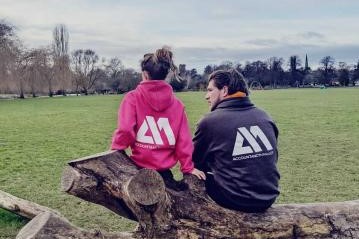James Byrne, co-founder and CEO of AccountancyManager, started off as an accountant. He created AM to make his life easier – only to arguably make life more complicated by running a software company. AM has grown to 26 people and over 5,000 active users in four years. So what’s his secret? Spoiler alert, it’s all about people.
James Byrne launched AccountancyManager in 2017 at Accountex. In fact, he and his co-founder Alex Hawke actually took suggestions from the first day of the exhibition and built them overnight. Presenting a new and improved version the next day. This groundbreaking technique of simply listening – and responding – has served James, and AccountancyManager, rather well.

James shares his tips for running a successful business, from the perspective of a practicing accountant – and half of the brains behind the UK’s most-loved practice management software.
1) Grow your client base with client testimonials
In the mid-2010s, James was working in a busy firm in the middle of Warwick. Before AM – or either of his young children – were on the horizon. He simply wanted more clients. Little did his colleagues know, their portfolios were about to expand somewhat too. James quadrupled his firm’s client base and turnover in three years.
Doing it the ‘Google way’
“If I’m looking for anything online, whether it’s a washing machine or a professional service, I always look at the rating on Google,” begins James. “So one of the things I started to do is, every time we sent out an email with the accounts attached, we’d ask for a testimonial.”
If you haven’t listed your business on Google, you should certainly go and do that first!”
“I copied the link on Google where it allows people to give your practice a star rating and popped that in the bottom of the email. So clients could just click the link, give us a rating and write a comment. That boosted the number of testimonials and ratings we had on Google. If you haven’t listed your business on Google, you should certainly go and do that first!”
“Even today, few accountants are adopting the ‘Google way’. So I think it’s a good opportunity to get on there. If there’s a selection of three or four different places, I’m always going to pick the one that’s got the highest rating with the most number of reviews. So you want to try to build those up.”
2) Improve your services (and get a morale boost) by asking the right questions
Jumping forward to 2021, James is still asking his users for their opinions. AccountancyManager constantly gathers quotes for social media and interviews users for case studies, which is a great way to show prospects the full experience. But it’s the feature suggestions and requested improvements that make the biggest difference to the continual development of our software. James recommends asking your clients what they want too. Whether it’s changes to your customer service or more business advice.
And the survey says?
“Surveys weren’t really something we did at my accountancy firm, but now, we generate surveys for our AccountancyManager customers a lot. Not only asking for suggestions but to check how everyone’s doing. Are they getting the value they want? How do they feel about our help and support? Is there anything we should be doing differently?”
“It makes perfect sense to transfer this approach to your practice – to any business in fact. You’ll discover opportunities to start introducing new things and improving others. So creating a quick survey and firing it out to customers is certainly another great tool you could use.”
Funnily enough, you can create forms within AccountancyManager and automatically add them to your clients’ portals to fill out. They get an email asking them to complete it. You get a notification when they have. Perfect for feedback, even better for Self Assessment questionnaires.
Give yourself – and your team – a morale boost
“What you’ll find is you’ll get some really lovely statements back,” continues James. “When I’m having a bad day and things aren’t going quite as I wanted them to, I like to read a case study from one of our customers. It’s a really nice boost for morale. I make sure the team sees these quotes and articles too.”
3) Talk to your team. Listen to your team. And aim to be challenged.
It’s not just James’ customers that get the third degree. Encouraging open – and sometimes anonymous – feedback from the team is a core value at AccountancyManager.
“My team also gets the opportunity to complete a survey to tell us how they feel about the business. How do they feel about management and communication? What changes would they like to see? We have an anonymous feedback form that they can complete at any time on Google Docs. Doing things like this with your team obviously ensures that you build a great team. You keep people happy. You don’t want to have a big churn of staff members, so if you can keep the same team on board and everybody feels like they’ve got a voice, that’s invaluable.”
As a great example, we mentioned in an article last year that we used software to monitor productivity levels whilst the team worked remotely during the lockdown. Despite the data being helpful from a management perspective, after a few months of giving it a go, feedback convinced James to scrap it.
Surround yourself with leaders, not ‘yes’ people
James and Alex have grown AM from a team of two people, to 26 people in four distinct teams: Development, Support, Sales & Marketing – in four years. That’s a lot of hiring, training up, reshuffling and creating space in the office.
I encourage my team to challenge me. And now they do… a lot. Sometimes I don’t like it – but it’s a good thing.”
“As you start to get past about ten employees, you need to start breaking it down into sections. I’m very fortunate to be in the situation at AccountancyManager with my teams and to have four great managers. I have a one-to-one with each manager a week, as well as an all managers’ meeting – and an all-staff meeting on Wednesday mornings. I think we’re up to three pages of faces on that Zoom call!”
“Being challenged is essential. You don’t want to be working with a bunch of ‘yes’ people because problems will arise later down the line, so I encourage my team to challenge me. And now they do… a lot. Sometimes I don’t like it – but it’s a good thing.
“That open communication and making sure we’re working together on a human level builds relationships in such a powerful way. I remember reading a book – ‘Why Am I Afraid to Tell You Who I Am?’ It talks about different levels of communication and the way that the majority of people communicate on a very basic level of just ‘how are you?’ And you just expect the other person to say, ‘yeah, I’m OK’. But just going a bit deeper will build much stronger relationships – with your team, but also with your clients.”
4) Block out time to digest ideas, think big and plan ahead
We’ve talked about listening to your clients and your team, now what about you, the business owner? Do you listen to your own thoughts and ideas in the same proactive way?
“If you watch an inspiring webinar, read a good article – or just have a random shower idea – block out some time in your calendar to assess and expand on those. I know if I don’t put the time in my calendar to do something, it very rarely happens. So block out a time frame to say, ‘this is when I’m going to put my thinking hat on, I’m going to sit down and write out some notes and see where I get to with it.’ You’ll find some really amazing stuff can come out.”
Transferring the software development concept of ‘technical’ debt to running a business
“When we’re developing features in AM, if we put the planning in beforehand, the amount of time it saves down the line is humongous. We learnt this the hard way. Right back at the beginning when it was just myself and Alex, I’d say “I want to build this. I want to build that,’ and he’d be building away. The problems you run into later down the line, we call ‘technical debt’, because you have to go back over it all, rewrite code in a different way etc.”
“It’s the same in business. If you’re making decisions without being clear and concise about the way you want to get there, you’re going to build that technical debt. Then it’s going to take more time and be less efficient So giving yourself that time is so important.”

